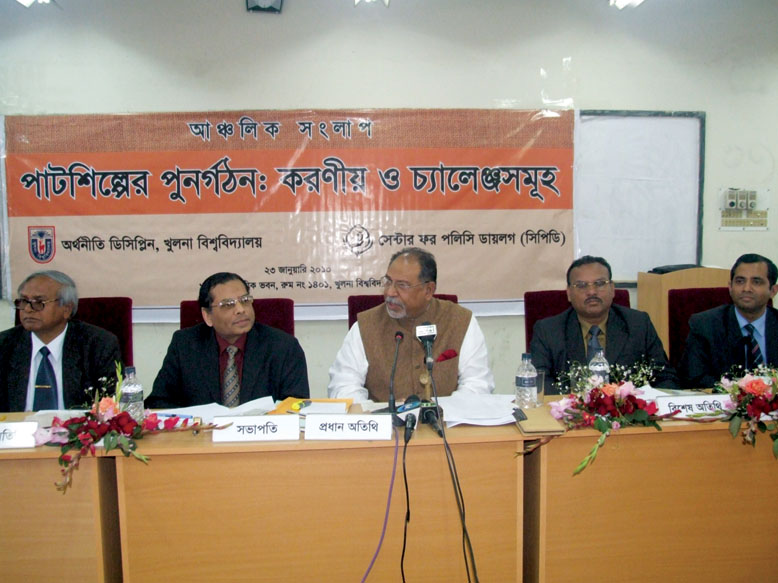Jute and Textiles Minister Abdul Latif Siddiqui, MP spelt out his government’s steps and plans at a local level dialogue on finding out possible ways to restructure country’s ailing jute sector.
Co-organised by the Centre for Policy Dialogue (CPD) and the Economics Discipline of Khulna University, the dialogue titled Restructuring of the Jute Manufacturing Sector in Bangladesh: Challenges and Options was held at the Academic Building of the University on 31 January 2010.
The Minister was present on the occasion as the Chief Guest while Dr Md Saifuddin Shah, Vice-Chancellor and Dr Purnendu Gain, Pro-Vice-Chancellor of Khulna University attended the dialogue as Special Guests with Executive Director of CPD Professor Mustafizur Rahman in the chair. Senior Research Fellow of CPD Dr Khondaker Golam Moazzem presented the keynote paper Restructuring of the Jute Manufacturing Sector in Bangladesh at a Crossroad: Challenges and the Way-out. Teachers and students of Khulna University, political leaders, private sector entrepreneurs, jute trade union leaders, senior officials of both public and private sector jute mills attended the dialogue.
Dr Moazzem stressed the need for policy interventions in three core areas such as strengthening relevant institutions, undertaking necessary reforms and restructuring of the BJMC, and raising the efficacy of privatisation of the SoEs related to the jute sector. His recommendations to revive the jute sector include improving management in the jute mills run by the BJMC, finding new markets for jute and jute goods, decentralisation of the jute mills, setting up of jute training institutes in the country, etc.
The Minister in his speech observed that the problem is not with the jute industry, rather it lies in the financial management of the sector.
He informed that the government is taking steps, including reinstatement of the retrenched workers and opening up of the closed jute mills. Peoples Jute Mill, Daulatpur Jute Mill, and Qaumi Jute Mill, now closed, will be reopened by August. The government would impart training to both workers and management personnel in the jute sector, he added.
He stressed the need for formulating state policies for this and said the state can stand strong if a sound political system can be established. Citing a sign of revitalisation of the jute sector in the country, the Minister pointed out that the main problem in the sector now is the lack of high quality jute seeds. Due to lack of water in the water bodies, rotting green jutes has also become a great problem, Siddiqui noted.
The Minister urged the trade union leaders to shift their attitude from agitation towards production-oriented activities. In this regard, he said, “Please let the workers live in peace.”
Mustafizur Rahman noted that the aim of organising such a dialogue is to provide policy inputs to the government to develop the jute industry of the country and explore new markets across the world. He suggested setting up of jute training centres and measures to raise the competitiveness of the sector in the global market.
Among others, Noni Gopal Mondal, MP from Khulna-1; Sheikh Harunur Rashid, Former Whip of Parliament; Dr Mohammad Ziaul Haider, Head of Economics Discipline of Khulna University; Khaild Hossain, General Secretary, Committee for Protection of Jute and Jute Industry; Forhad Ahmed Akand, Senior Vice President, Khulna Chamber of Commerce and Industry also spoke on the occasion.
Paper Presented
Restructuring of the Jute Manufacturing Sector in Bangladesh at a Crossroad: Challenges and the Way-out



